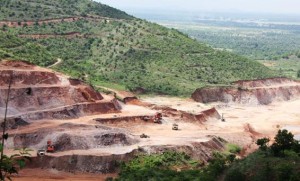Mining, Repression and Imprisonment, an Uncertain Future
By Burma Partnership • October 8, 2012 Burma has been internationally praised for moving in a more democratic direction recently. Sadly for many citizens these changes are a world away. Their interactions with the Burma government are characterized by the same repressive, corrupt, strong armed tactics that made Burma an international pariah for decades.
Burma has been internationally praised for moving in a more democratic direction recently. Sadly for many citizens these changes are a world away. Their interactions with the Burma government are characterized by the same repressive, corrupt, strong armed tactics that made Burma an international pariah for decades.
In the Letpadaung mountains, huge amounts of land have been forcibly confiscated by the government, environmental degradation has occurred and a policy of arrest and detention of peaceful protestors has been implemented. The Monywa Copper Project is located in central Burma’s Sagaing Division with four large deposits: Sabetaung, Sabetaung South, Kyisintaung and Letpadaung. The project covers almost 8,000 acres of land, the majority of which was forcibly taken from villagers.
Resource extraction has been the cause of some of Burma’s largest human rights violations and land confiscations. The Monywa Copper Project is the country’s largest mine in terms of recovery rates, production and revenue. Protests over the project and national attention have been growing, as have the number of arrests and detentions in association with those protests and land confiscation cases.
A Chinese mining company Wan Bao in collaboration with the Burma Army-backed Economic Holdings Ltd. (UMEHL) has confiscated over 7,800 acres of land for the copper mine in the Letpadaung mountain range. Another specific example would be in the town of Wethmay, one of more than two dozen towns affected by the project. This past December authorities tried to force villagers to leave by destroying the village monastery, taking away the religious statues and removing all of the furniture and equipment for the primary school. The villagers organized themselves and protested, so far avoiding the forced relocation and land confiscation that has occurred with increased frequency in this area.
The protest drew national attention; it also resulted in the arrest and detention of 12 peaceful protesters. Nine were released the day and night after the protest, but three were held for four days until a public outcry for their release was headed.
In another instance of unjust arrest and detention Wai Lu, a former political prisoner and land rights activist whose involvement has furthered the prominence of the case, was taken off a bus returning to Rangoon, charged for religious offences and detained for two weeks.
There have also been cases of media restrictions surrounding the project. In March, a private weekly newspaper, The Voice, was sued by the Ministry of Mines after reporting on corruption by the government and the Wan Bao Chinese company involved in the mine.
In addition to the forced relocation, land confiscation, and arrest of peaceful protesters, there is huge environmental degradation occurring in association with the Monywa project. The run off from the mines has irreversibly changed the ecology of surrounding rivers and fields. Villagers are forced to buy bottled drinking water. “While those who cannot afford to have no choice but to drink the contaminated supply. We’re afraid that if this water goes into the Chindwin River it will get worse for the people downstream,” said Han Win Aung of the Political Prisoners Families Network.
Despite the publicized changes that have been occurring in Burma, more and more of these worrying stories are coming out of rural areas. Corrupt government authorities, cronies and the military are taking land from villagers and farmers; those who protest are arrested and imprisoned and media outlets that report on it are sued. All of this is occurring under the cloud of irreversible environmental damage, suggesting an uncertain future for the people of Burma in terms of development, peace and prosperity.
Tags: Burma Partnership, Environment, Investment, Land Confiscation, Letpadaung Copper Mine, Mining, MonywaThis post is in: Blog
Related PostsBurma Partnership Celebrates Continuing Regional Solidarity for Burma and Embraces the Work Ahead for Progressive Voice
Burma Army Displays Blatant Disregard for 21st Century Panglong Peace Process
Ann Din Coal Power Plant: Local Movement and Action to Preserve and Protect Natural Resources and Land: Mon IDP Report Case Study #4
Latest Human Rights Abuse Case Demonstrates Urgent Need to Reform the Myanmar National Human Rights Commission
Human Rights Far From Guaranteed as US Sanctions on Burma Are Removed









 All posts
All posts